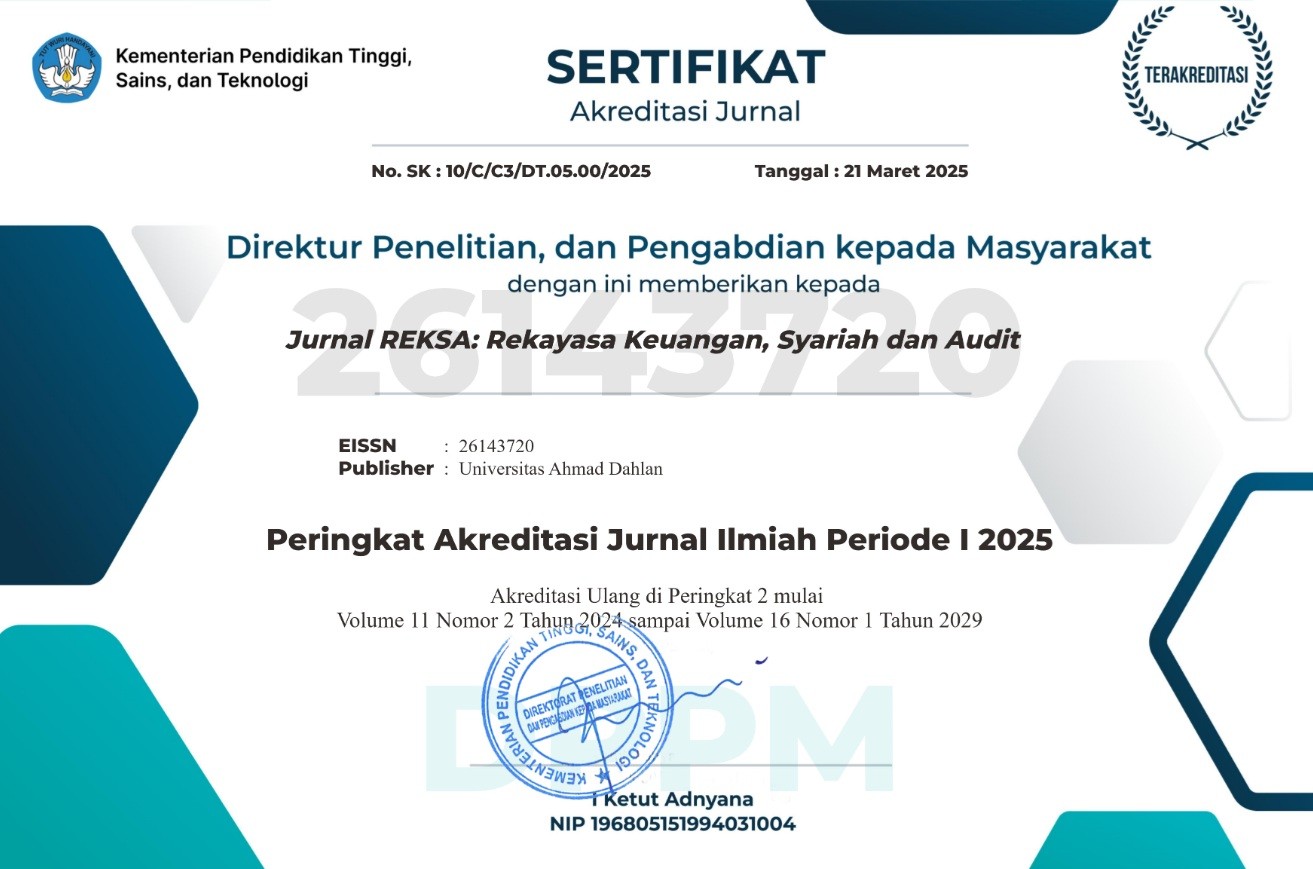PENGARUH DANA PIHAK KETIGA, MARGIN KEUNTUNGAN, SERTIFIKAT WADIAH BANK INDONESIA, RETURN ON ASSET, DAN NON PERFORMING FINANCING TERHADAP PEMBIAYAAN MURABAHAH PADA BANK SYARIAH MANDIRI DAN BANK MUAMALAT INDONESIA PERIODA 2009-2013
DOI:
https://doi.org/10.12928/j.reksa.v4i1.37Keywords:
Murabahah Financing, Third Party Funds (DPK), profit margin, Wadiah Certificate of Indonesian Bank (SWBI), Return on Assets (ROA), and Non Performing Financing (NPF).Abstract
Islamic banks have the same functionality conventional banks as intermediaries of financial services (financial intermediary), has a fundamental duty to collect funds from the public and channeled back to the community in the form of financing facilities. Fund raising is done through savings and investments such, wadiah deposits, savings and time deposits. The distribution of funds is done with some kind of contract as, murabahah, istishna, mudharabah, musyarakah, ijarah, and salam. The purpose of this research is to determine the effect of Third party funds (DPK), profit margin, wadiah certificate of Indonesian Bank (SWBI), return on assets (ROA), and non performing financing (NPF) to murabahah financing. Object in the reserach is Bank Syariah Mandiri and Bank Muamalat Indonesia period 2009-2013. The result of analysis showed by simultan DPK, profit margin, SWBI, ROA, and NPF effect to murabahah financing. Predictive ability of the five variables to financing is 98.7% which is indicated by the amount of adjusted R2 and the rest is influenced by other variables. DPK, and ROA partially positive effect to murabahah financing. SWBI negatively affect to murabahah financing. The profit margin is not a positive influence to murabahah financing and NPF does not negative affect to murabahah financing.Downloads
Published
2018-07-04
How to Cite
Amalia, R., & Hidayah, K. (2018). PENGARUH DANA PIHAK KETIGA, MARGIN KEUNTUNGAN, SERTIFIKAT WADIAH BANK INDONESIA, RETURN ON ASSET, DAN NON PERFORMING FINANCING TERHADAP PEMBIAYAAN MURABAHAH PADA BANK SYARIAH MANDIRI DAN BANK MUAMALAT INDONESIA PERIODA 2009-2013. Jurnal REKSA: Rekayasa Keuangan, Syariah Dan Audit, 4(1), 1–19. https://doi.org/10.12928/j.reksa.v4i1.37
Issue
Section
Articles
License
Authors who publish with JURNAL REKSA agree to the following terms:
- Authors retain copyright and grant the JURNAL REKSA right of first publication with the work simultaneously licensed under a Creative Commons Attribution License (CC BY-SA 4.0) that allows others to share (copy and redistribute the material in any medium or format) and adapt (remix, transform, and build upon the material) the work for any purpose, even commercially with an acknowledgment of the work's authorship and initial publication in JURNAL REKSA.
- Authors are able to enter into separate, additional contractual arrangements for the non-exclusive distribution of the journal's published version of the work (e.g., post it to an institutional repository or publish it in a book), with an acknowledgment of its initial publication in JURNAL REKSA.
- Authors are permitted and encouraged to post their work online (e.g., in institutional repositories or on their website) prior to and during the submission process, as it can lead to productive exchanges, as well as earlier and greater citation of published work (See The Effect of Open Access).




